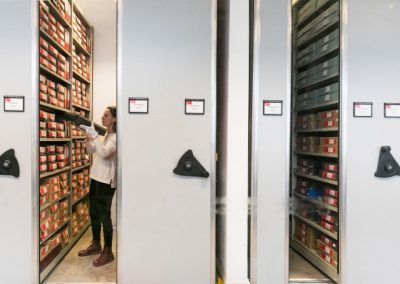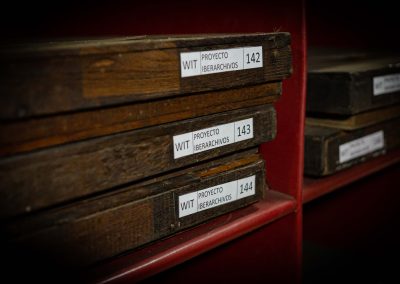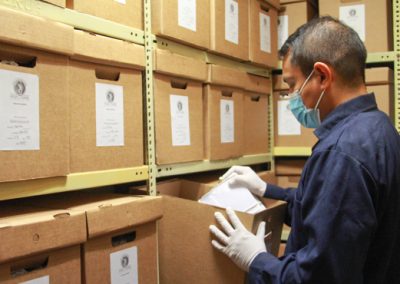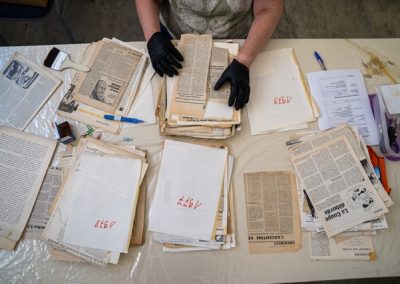WHAT IS IBERARCHIVOS?
Iberarchivos is an initiative for the cooperation and integration of Ibero-American countries, articulated and ratified by the Ibero-American Conferences of Heads of State and Government, to promote access, organisation, description, conservation and dissemination of documentary heritage, making a decisive contribution to consolidating the Ibero-American Cultural Area.
The programme encourages ties of solidarity and strengthens the capacities of professionals and the promotion of Ibero-American archives of any kind, from the General Archives of the Nation to Municipal Archives, including archives of Human Rights institutions and Indigenous Peoples, among others.
The programme is a financial fund that supports projects submitted to the annual calls for grants for archival projects. Between the first call for aid in 1999 and the last, approved in 2023, 1,4367 projects were supported in 23 Ibero-American countries, with a total investment of 6,596,335.95€ and 1,671,854 USD.
Origins of the Programme
With 25 years of experience, the Iberarchivos programme is one of the oldest Ibero-American cooperation programmes. It originated as an initiative presented by Spain at the VII Ibero-American Summit on Margarita Island (1997) and was immediately supported by several countries and the Latin American Archives Association(ALA).
At the 8th Summit held in Porto (Portugal) in 1998, the Programme received its final approval and was elevated to the category of Ibero-American Cooperation Programme with the name Support Programme for the Development of Ibero-American Archives and its acronym ADAI. With the amendment of the Programme’s regulations at the XIX Meeting of its Intergovernmental Council, held in Mexico City in November 2017, its name was changed to the one currently used: Iberarquivos.
Projects by country 1999-2024
Chart of approved projects by country and call for proposals
| 1999 | 2000 | 2001 | 2002 | 2003 | 2004 | 2005 | 2005E | 2006 | 2007 | 2008 | 2009 | 2010 | 2011 | 2012 | 2013 | 2014 | 2015 | 2016 | 2017 | 2018 | 2019 | 2020 | 2021 | 2022 | 2023 | 2024 | Total | |
|---|---|---|---|---|---|---|---|---|---|---|---|---|---|---|---|---|---|---|---|---|---|---|---|---|---|---|---|---|
| ARGENTINA | 2 | 3 | 1 | 3 | 4 | 12 | 9 | 9 | 2 | 2 | 3 | 3 | 1 | 2 | 5 | 2 | 2 | 4 | 3 | 3 | 75 | |||||||
| BOLIVIA | 1 | 3 | 2 | 1 | 5 | 1 | 13 | |||||||||||||||||||||
| BRAZIL | 6 | 5 | 6 | 7 | 6 | 6 | 7 | 6 | 4 | 7 | 5 | 5 | 5 | 1 | 2 | 2 | 3 | 2 | 6 | 3 | 2 | 2 | 3 | 3 | 3 | 107 | ||
| CHILE | 3 | 8 | 10 | 9 | 5 | 8 | 10 | 10 | 7 | 6 | 3 | 3 | 3 | 3 | 1 | 1 | 2 | 2 | 2 | 1 | 3 | 3 | 3 | 106 | ||||
| COLOMBIA | 3 | 7 | 7 | 11 | 13 | 8 | 6 | 10 | 14 | 11 | 10 | 10 | 9 | 4 | 4 | 3 | 4 | 4 | 1 | 4 | 1 | 1 | 3 | 3 | 3 | 154 | ||
| COSTA RICA | 4 | 4 | 5 | 6 | 12 | 10 | 12 | 15 | 13 | 10 | 14 | 9 | 10 | 3 | 4 | 4 | 5 | 6 | 2 | 3 | 3 | 1 | 4 | 159 | ||||
| CUBA | 6 | 7 | 9 | 13 | 13 | 23 | 18 | 18 | 20 | 28 | 30 | 12 | 8 | 7 | 3 | 1 | 4 | 220 | ||||||||||
| ECUADOR | 1 | 4 | 4 | 1 | 1 | 3 | 1 | 1 | 3 | 3 | 4 | 26 | ||||||||||||||||
| EL SALVADOR | 1 | 1 | 1 | 1 | 1 | 5 | 3 | 4 | 3 | 4 | 1 | 25 | ||||||||||||||||
| SPAIN | 1 | 1 | 1 | 2 | 2 | 2 | 2 | 3 | 3 | 2 | 19 | |||||||||||||||||
| PHILIPPINES | 3 | 2 | 1 | 6 | ||||||||||||||||||||||||
| GUATEMALA | 1 | 1 | 1 | 1 | 1 | 1 | 6 | |||||||||||||||||||||
| HONDURAS | 1 | 2 | 3 | |||||||||||||||||||||||||
| MEXICO | 1 | 5 | 6 | 5 | 9 | 8 | 7 | 5 | 5 | 8 | 8 | 9 | 10 | 4 | 3 | 3 | 5 | 3 | 1 | 4 | 3 | 2 | 2 | 3 | 3 | 3 | 125 | |
| NICARAGUA | 1 | 1 | 1 | 1 | 1 | 5 | ||||||||||||||||||||||
| PANAMA | 1 | 2 | 2 | 4 | 2 | 4 | 2 | 4 | 4 | 1 | 4 | 1 | 31 | |||||||||||||||
| PARAGUAY | 1 | 3 | 2 | 4 | 10 | |||||||||||||||||||||||
| PERU | 4 | 6 | 7 | 5 | 2 | 1 | 14 | 8 | 18 | 9 | 2 | 3 | 2 | 5 | 1 | 2 | 3 | 2 | 2 | 4 | 5 | 4 | 109 | |||||
| PORTUGAL | 3 | 2 | 1 | 2 | 1 | 4 | 3 | 2 | 1 | 1 | 1 | 2 | 3 | 26 | ||||||||||||||
| PUERTO RICO | 4 | 12 | 10 | 7 | 6 | 14 | 1 | 5 | 3 | 3 | 2 | 1 | 3 | 2 | 1 | 2 | 2 | 2 | 80 | |||||||||
| DOMINICAN REP. | 1 | 1 | 1 | 1 | 8 | 1 | 6 | 1 | 4 | 4 | 4 | 3 | 1 | 1 | 2 | 2 | 2 | 2 | 2 | 2 | 49 | |||||||
| URUGUAY | 2 | 1 | 1 | 12 | 15 | 19 | 9 | 13 | 11 | 8 | 2 | 4 | 2 | 3 | 3 | 2 | 3 | 3 | 2 | 1 | 5 | 4 | 3 | 128 | ||||
| VENEZUELA | 1 | 1 | 2 | |||||||||||||||||||||||||
| SUPRANATIONALS | 2 | 3 | 1 | 1 | 1 | 1 | 2 | 3 | 2 | 2 | 1 | 1 | 1 | 1 | 1 | 23 | ||||||||||||
| Total | 35 | 45 | 49 | 59 | 74 | 73 | 74 | 99 | 108 | 96 | 141 | 99 | 95 | 30 | 47 | 36 | 43 | 50 | 20 | 2 | 39 | 37 | 23 | 21 | 36 | 36 | 40 | 1507 |
Structure
The Programme is structured through an Intergovernmental Council that meets annually and is made up of the national archival authorities of the following Ibero-American countries: Argentina, Brazil, Chile, Colombia, Costa Rica, Cuba, Ecuador, Spain, El Salvador, Philippines, Mexico, Panama, Peru, Portugal, Puerto Rico, Dominican Republic and Uruguay.
This Committee defines the programme’s policy and strategic lines, as well as being responsible for the annual approval of projects, in accordance with the Iberarchivos Operating Regulations.
The Chair of the Intergovernmental Council is Silvestre Almeida Lacerda Director General del Libro, de los Archivos y de las Bibliotecas de Portugal.
The Executive Council facilitates the smooth running of the Programme and is made up of three elected members of the Intergovernmental Committee, currently Uruguay (Mr. Mauricio Vázquez), Cuba (Mrs. Isabel Vivar) and the Dominican Republic (Mr. José Vílchez).
The Technical Unit is the executive head of the Programme and is managed by the “Subdirección General de los Archivos Estatales” of the Spanish Ministry of Culture. This unit is made up of its Technical Secretary, Mrs. Cristina Díaz Martínez, Mr. Miguel Ángel Bermejo Alonso, Mrs. Adriana Martín Moreno, Mr. Alfonso Bustos Gracia and Mrs. María Isabel García García.

How are Iberarchivos grants awarded?
The Technical Unit is responsible for preparing the request for aid for archival projects, which is approved annually by the Iberarchivos Intergovernmental Council.
Announcements are publicised mainly through the National Archival Authorities and the AECID Technical Cooperation Offices and through our social networks.
Candidate institutions should contact the National Archival Authority from the project design phase and/or the Technical Unit.
In each country participating in the Iberarchivos Programme, a National Evaluation Committee will be set up each year, chaired by the National Archival Authority. Together with the Programme’s Technical Unit, this Committee will evaluate project applications that meet the requirements of the Call for Proposals.
These grants will be awarded on a competitive basis, in accordance with the principles of objectivity, transparency, equality, non-discrimination and publicity.
The annual meeting of the Iberarchives Intergovernmental Council will determine the projects approved by each call and the subsidy amounts.





































